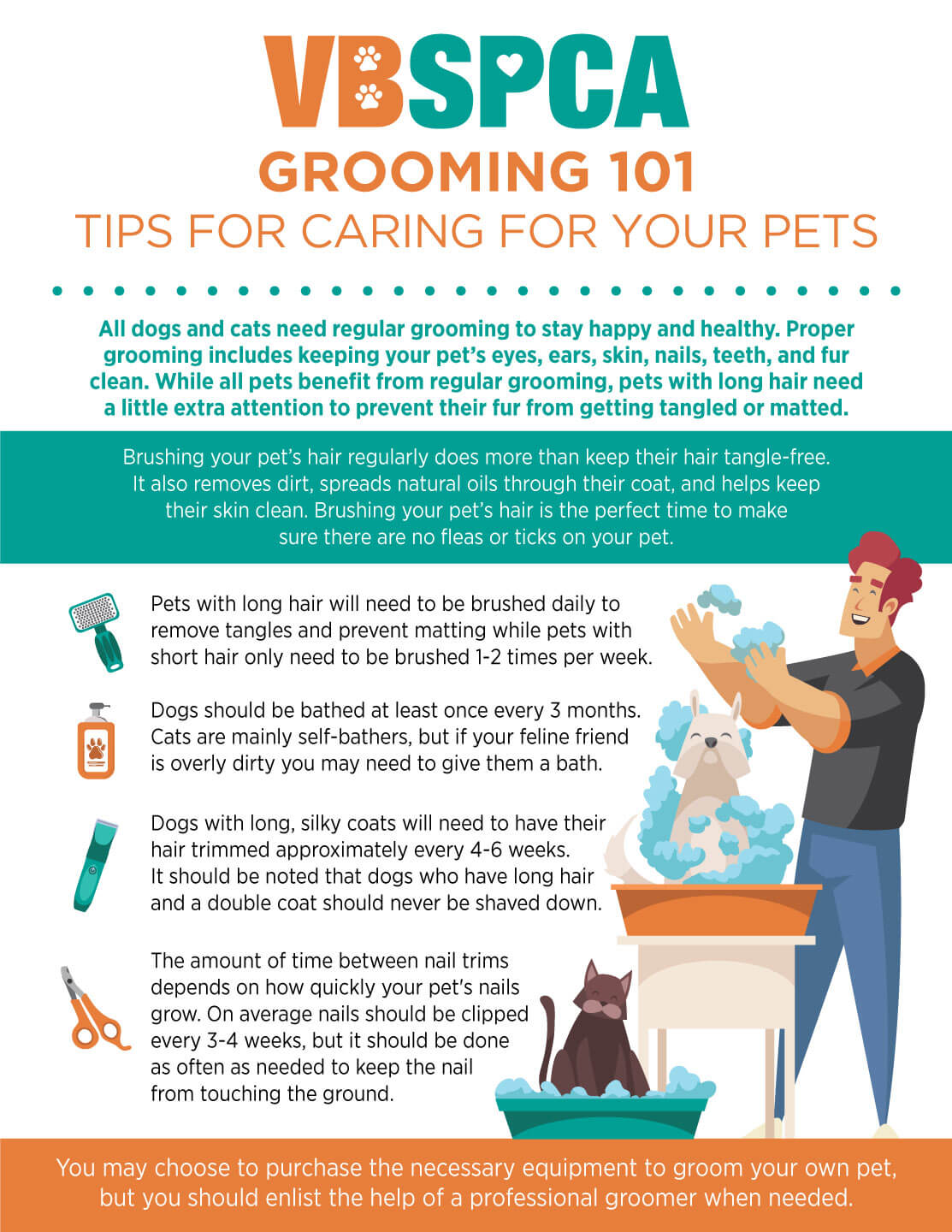
Happy Tails | Kenzo
Every single animal that comes through our shelter has a story. Some are complex, many are sad, but all of them get better the minute they arrive at the Virginia Beach SPCA. Kenzo was part of an unplanned litter of five puppies that was surrendered to the VBSPCA in February 2021. The long coat Chihuahua mixes went into a foster home until they were ready for adoption. When Amaya came in to meet the pups in March, Kenzo stood out from the rest of his siblings since he was the only boy and had golden hair. We recently caught up with Amaya to get an update on Kenzo.
How is Kenzo doing in the home?
Kenzo took no time at all to adjust when I initially adopted him. Now we’re practically in sync, and I can easily navigate his emotions and needs/wants. He’s happy, healthy, and has no problem letting me know when he isn’t.
 What sort of activities do you and Kenzo do together?
What sort of activities do you and Kenzo do together?
Kenzo and I love to cuddle! Any time I’m taking a nap, he’s right by my side. We also frequent trips to grandma’s house so he can get all of those no-no snacks he can’t get at home and he pays her in kisses (Grandmas! Am I right?). Other than being PetSmart junkies, we spend most of our time playing tug-of-war or fetch, or simply lounging around.
Does Kenzo have any funny quirks?
Kenzo likes to do this weird thing where anytime we’re playing fetch and I have the toy in my hand ready to throw it, he’ll jump up to grab it with no regard for landing. He doesn’t seem to account for what will happen once it’s time to come out of the air and simply throws his body. He completely disregards the need for a landing pose, clear ground, and just looks like a fish out of water. I’m assuming it’s pure dedication, and he’s just willing to compromise his body to achieve the goal of getting the toy from my hand. I aspire to be as dedicated to my goals! (Minus the sacrificing of my limbs…)
How has Kenzo enriched your lives so far?
I find myself constantly expressing my appreciation for being Kenzo’s mom. He is supportive, kind, and understands me so well. Before adopting him, I never truly understood the depths of relationships with pets. I now know it is one of the most rewarding experiences anyone could have. We have such a long road ahead of us, but this small amount of time we’ve already spent together is enough to fill my heart for a lifetime.
Why do you think people should consider adopting a shelter pet?
I’m a first-time adopter, and like many others I had concerns with adopting. The first would be not being able to find a breed that would suit my lifestyle. The second was finding a dog that would have trouble adjusting since I’m not equipped with enough knowledge. Both of my concerns were easily dismissed when I found Kenzo. I’d tell anyone who is interested in adopting that it’s a journey that requires patience, but the perfect pet is out there! You just have to find each other.
Is there anything else you would like to add?
Adopting was extremely cost efficient and educational. When I adopted Kenzo, I was given all of his necessary medications, some food, and plenty of helpful resources to answer any questions I had. The VBSPCA also had an affordable clinic, which was a huge win! I was able to afford adoption, shots, meds, and new pet supplies, which still totaled to half of what it’d cost me to purchase a dog elsewhere. I was taught signs to look for when integrating him with other dogs and new people. The VBSPCA also gave me helpful advice on feeding, potty training, and crate training! I look forward to adopting again in the future.

Happy Tails | Cali
Every single animal that comes through our shelter has a story. Some are complex, many are sad, but all of them get better the minute they arrive at the Virginia Beach SPCA. Cali arrived at the VBSPCA in August of 2019 as a young puppy. She wasn’t in our care for very long. Delynda had been wanting to adopt a puppy, and the moment she laid eyes on Cali, she knew the little Golden Retriever mix was “the one”. We recently caught up with Delynda to get an update on Cali.
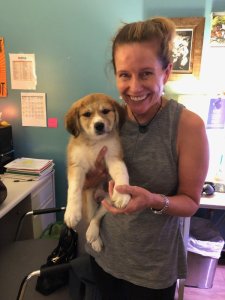 How’s Cali doing in the home?
How’s Cali doing in the home?
Cali instantly took to our home and her big brother Lewie (a Llewelyn Setter). Even though she is smaller than Lewie, she rules the roost. She is perfectly happy when we crate her but we are now, as she is a little more than two years old, able to leave her out during the day with Lewie when we are gone for short periods. Cali is extremely smart and does well with training. She is extremely food motivated.
We have met some challenges that have given us the opportunity to love on Cali and pour more affection into her. She tends to be very fearful and somewhat anxious when meeting new people. It feels great to continue building her confidence as we watch her become more trusting of us and the new situations we experience.
What sort of activities do you and Cali do together?
Cali loves to go for walks and can’t get enough of the car. Almost every evening my husband and I take the dogs out on our dock to watch the sunset on North Landing River at Munden Point. We have a gate on the end of the dock so we can unleash the dogs and let them explore safely. They enjoy watching the birds, the jumping fish, and the boats going by.
Does Cali have any funny quirks?
 There’s one I call the “Cali Flip.” If she trusts a person and they pet her, she instantly melts and flips on her back without even trying. She absolutely adores belly rubs! She also knows when it is getting close to feeding time; she silently and suddenly appears, all the while attempting to look adorable, which she has no problem doing as she always makes her adorable Cali face.
There’s one I call the “Cali Flip.” If she trusts a person and they pet her, she instantly melts and flips on her back without even trying. She absolutely adores belly rubs! She also knows when it is getting close to feeding time; she silently and suddenly appears, all the while attempting to look adorable, which she has no problem doing as she always makes her adorable Cali face.
How has Cali enriched your life so far?
Cali is such a bright light in our lives. It makes me so proud that she trusted me enough to bring her into our home. She keeps us giggling every day. She is pure joy!
Why do you think people should consider adopting a pet from a shelter?
People should realize that pets do not end up in a shelter on their own will. It is important to acknowledge that a pet’s past life and home situation may certainly have a bearing on their demeanor. Animals deserve a second chance at a solid family life. Animals who are given care and affection will often flourish in the right loving environment.
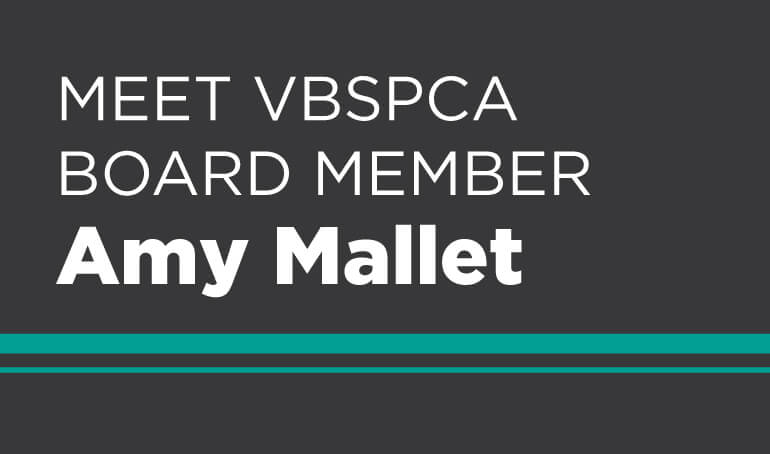
Amy Mallet | In Service to the VBSPCA for 2 Years
As a proud pet parent of two rescue dogs, Amy Mallet is a passionate advocate for animal adoption. She joined the Virginia Beach SPCA Board of Directors two years ago because of her experience with her own pets. “By serving on the VBSPCA Board of Directors, I have been able to share that joy of pet adoption with others and garner more support for animals looking for forever homes,” said Mallet.
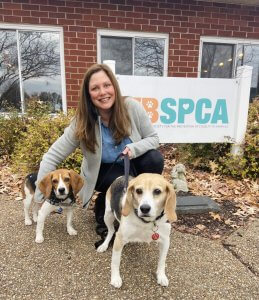 With more than 20 years of experience in marketing and communications, Mallet lends her expertise to the VBSPCA and other organizations. She is currently the manager of the Virginia Natural Gas Corporate Communications team and serves as the chair of the Virginia Natural Gas EverGreen team, a group dedicated to supporting the company’s environment and sustainability efforts. Mallet also volunteers her time to the Bay Beagle Rescue, Salvation Army, and United Way. She lives in Virginia Beach with her two Beagles, Cooper and Wilson.
With more than 20 years of experience in marketing and communications, Mallet lends her expertise to the VBSPCA and other organizations. She is currently the manager of the Virginia Natural Gas Corporate Communications team and serves as the chair of the Virginia Natural Gas EverGreen team, a group dedicated to supporting the company’s environment and sustainability efforts. Mallet also volunteers her time to the Bay Beagle Rescue, Salvation Army, and United Way. She lives in Virginia Beach with her two Beagles, Cooper and Wilson.
Mallet says she was drawn to volunteer with the VBSPCA because of its mission to provide compassion for animals in need. “I am a passionate champion for the welfare of our animals,” said Mallet. “The VBSPCA exemplifies its dedication to being true community partners by teaching individuals to be more humane and responsible in the treatment of animals.”
Educating the community about the variety of services offered at the VBSPCA is a priority for Mallet. She hopes to inspire others to support the animals in any way they can. “The VBSPCA provides opportunities for people of all ages to touch the lives of animals who need a warm home and lots of love,” said Mallet. “Individuals can volunteer to take a dog for a walk, read to animals, donate supplies, foster a pet, participate in a fundraising event, or give monetary donations, just to name a few.”
Dedicated individuals like Mallet ensure the VBSPCA can continue working towards its mission of eliminating animal suffering. We are grateful for everything she does to help our animals!
If you are interested in serving on the Virginia Beach SPCA Board of Directors, please email Emily.Peck@vbspca.com for more information.

Happy Tails | Gouda
Every single animal that comes through our shelter has a story. Some are complex, many are sad, but all of them get better the minute they arrive at the Virginia Beach SPCA. Gouda arrived at the VBSPCA in May of 2021. His previous owners surrendered him because another cat in the home did not appreciate his playful nature. The two year old orange tabby kept getting looked over at our shelter until a special little girl named Ella visited him. After two months in our care, Gouda had finally found his home and was adopted in July. We recently caught up with Ella to get an update on Gouda.
How did you know Gouda was the one for you?
My mother called me and said she was looking at cats while at work and we should get one. My dad was not thrilled with this idea at all. See, my dad is a dog person and has never liked cats. I immediately went to get my phone to look at the VBSPCA’s website and saw this beautiful tabby boy named Gouda. I knew he was the cat for us because my mom owns a charcuterie business. I also read that he did not like other cats, which was great because we have two dogs and I knew he would like them. The next morning, my mom and dad took me to the VBSPCA to go look at Gouda. I immediately fell in love with him and so did my mom. I even sweetened the pot by saying that I would pay for all his adoption and set-up fees, but I asked my mom and dad if they would help me with the food because I don’t have a job and he needs to eat.
How is Gouda doing in the home?
Gouda has two new brothers, Smokey and Bandit, the Mini Australian Shepherds. They have become good friends and play all the time. Gouda thinks he is an Aussie, even greeting us at the door with his brothers. He has another brother too which he is not sure about. Red Beard is a Bearded Dragon who constantly stares at him wondering what he is doing in his room and where this furball came from.
What sort of activities do you and Gouda do together?
Gouda has a hammock that sits in the window, so he is comfortable watching TV with the family and his crazy brothers. He likes to play with my dad every night and will not go to sleep until my dad and mom kiss me goodnight and my brothers jump all over my bed. He also likes to be put under the covers with me to sleep at night. He loves to have his belly rubbed just like his brothers; he even tries to take their bones from them and gets jealous when he does not have one of his own. Whenever he wants pets, he shakes his tail and bounces all over the house until you pay attention to him.
How has Gouda enriched your lives so far?
My Dad, even though he did not want a cat, thinks that Gouda is a great addition to the family. My Mom is smitten with him and even gets a little upset that Gouda will not sleep with her, but he does make sure that she works out every morning, even critiquing her form on the Peloton.
Why do you think people should consider adopting a shelter pet?
We would have never found him if it were not for the great people at the VBSPCA and the time and effort that they put into every animal. I think that people need to adopt more shelter pets because they are amazing and need good homes, even though Gouda has become more dog-like than cat-like.
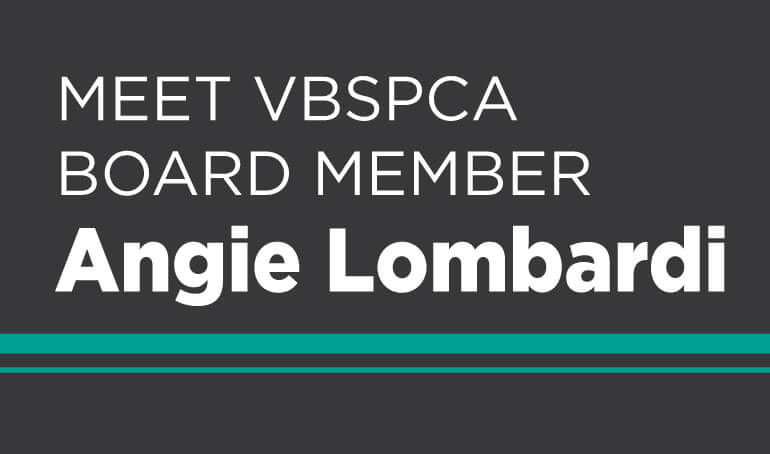
Angie Lombardi | In Service to the VBSPCA for 9 Years
As a lifelong animal lover, Angie Lombardi began volunteering at the Virginia Beach SPCA over a decade ago. Once she learned more about the organization, she jumped at the chance to serve on the Board of Directors. “I wanted to help make a difference in the lives of the pets and be their voice,” said Lombardi. Nine years later, she remains an engaged member of the board. “The VBSPCA can’t take care of these sweet souls without support from the community it serves.”
Lombardi provides the VBSPCA with expertise in marketing. She has 20 years of experience in marketing and sales including her current role as Vice President of Marketing at The Franklin Johnston Group. In addition to her service to the VBSPCA, Lombardi volunteers her time on the board of the Virginia Apartment Management Association. 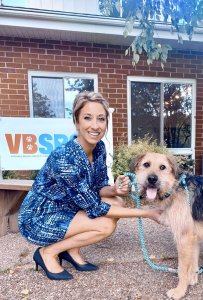 While she connects very closely with the VBSPCA’s overall mission, Lombardi is most passionate about the level of compassion provided to both the animals and their families. “Seeing how the team works with family members who need to relinquish their pets, partnering with other animal welfare organizations and rural shelters that need more support – the love and care that is put into the animals that end up at the shelter is remarkable.”
While she connects very closely with the VBSPCA’s overall mission, Lombardi is most passionate about the level of compassion provided to both the animals and their families. “Seeing how the team works with family members who need to relinquish their pets, partnering with other animal welfare organizations and rural shelters that need more support – the love and care that is put into the animals that end up at the shelter is remarkable.”
Lombardi focuses on getting the word out about the many ways the community can support the VBSPCA. “Adopt, foster, donate (money or supplies), attend events, sign up to be a volunteer, share our stories on social media… It’s truly amazing how much goes on within the shelter and clinic and how many animals are cared for every single day.”
Dedicated individuals like Lombardi ensure the VBSPCA can continue working towards its mission of eliminating animal suffering. We are grateful for everything she does to help our animals!
If you are interested in serving on the Virginia Beach SPCA Board of Directors, please email Emily.Peck@vbspca.com for more information.
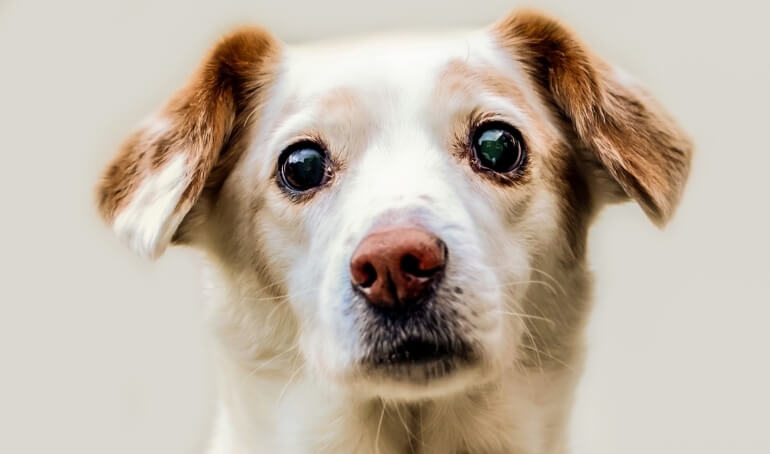
Allergies in Pets | Causes & Treatment Options
Anyone who has ever dealt with allergies certainly understands the misery those symptoms can bring. Unfortunately cats and dogs can also suffer from allergies.
There are three main causes of allergies in pets: fleas, environmental allergies, and food allergies. The most common symptoms of allergies include itchy skin, coughing or sneezing, discharge from the nose and/or eyes, and vomiting and/or diarrhea. As always, see your veterinarian if you notice your pet has those symptoms.
Flea Allergies
Flea bites usually only cause minor irritation in dogs or cats. However, those who are allergic to flea bites can have a severe reaction to just a single bite. Animals who are allergic to flea bites will chew or scratch incessantly, usually losing large amounts of hair in the process. The resulting irritation on the skin can also lead to a bacterial infection. Your veterinarian can prescribe a steroid or antihistamine, and if necessary, an antibiotic.
The best way to prevent issues resulting from flea bites is to apply monthly flea treatments to your cat or dog. Even if your pet is not allergic, these preventatives will help them avoid the discomfort that comes from flea bites.
Environmental Allergies
Just like humans, dogs and cats can react to a variety of environmental allergens such as tree pollens, grasses, molds, and dust mites. While people with these allergies mainly suffer from upper respiratory symptoms, pets are most likely to have severely itchy skin causing them to lick, chew, and even rub up against things to try to alleviate the itching.
Bathing your pet can reduce their discomfort and wash off the offending allergen(s). Your veterinarian can also prescribe medication that can be administered at home or provide your furry friend with an injection to combat their symptoms.
Food Allergies
Food allergies are much less common than flea or environmental allergies, but they can occur. If your pet does have a food allergy, chances are they are allergic to the protein used in the food, not the grains. Symptoms of a food allergy include gastrointestinal issues and itchy skin.
If your veterinarian suspects your pet has a food allergy, the only way to know for sure is a food elimination trial. Your veterinarian would prescribe a very specific diet and you would not be able to feed your pet anything else during the trial. If your pet’s symptoms improve, your veterinarian would then have your pet return to his original diet to confirm the allergy. If a food allergy is confirmed, your veterinarian can help develop a feeding plan for your cat or dog.
Other Allergens
Pets can also have allergic reactions to insect bites, medications, vaccinations, and other substances. In addition to the symptoms mentioned above, other signs that your dog or cat is having an allergic reaction include swelling or redness, lethargy, and difficulty breathing. Whether your pet is experiencing a dangerous reaction or his usual seasonal allergies, it is important to seek help from your veterinarian to keep your pet happy and healthy.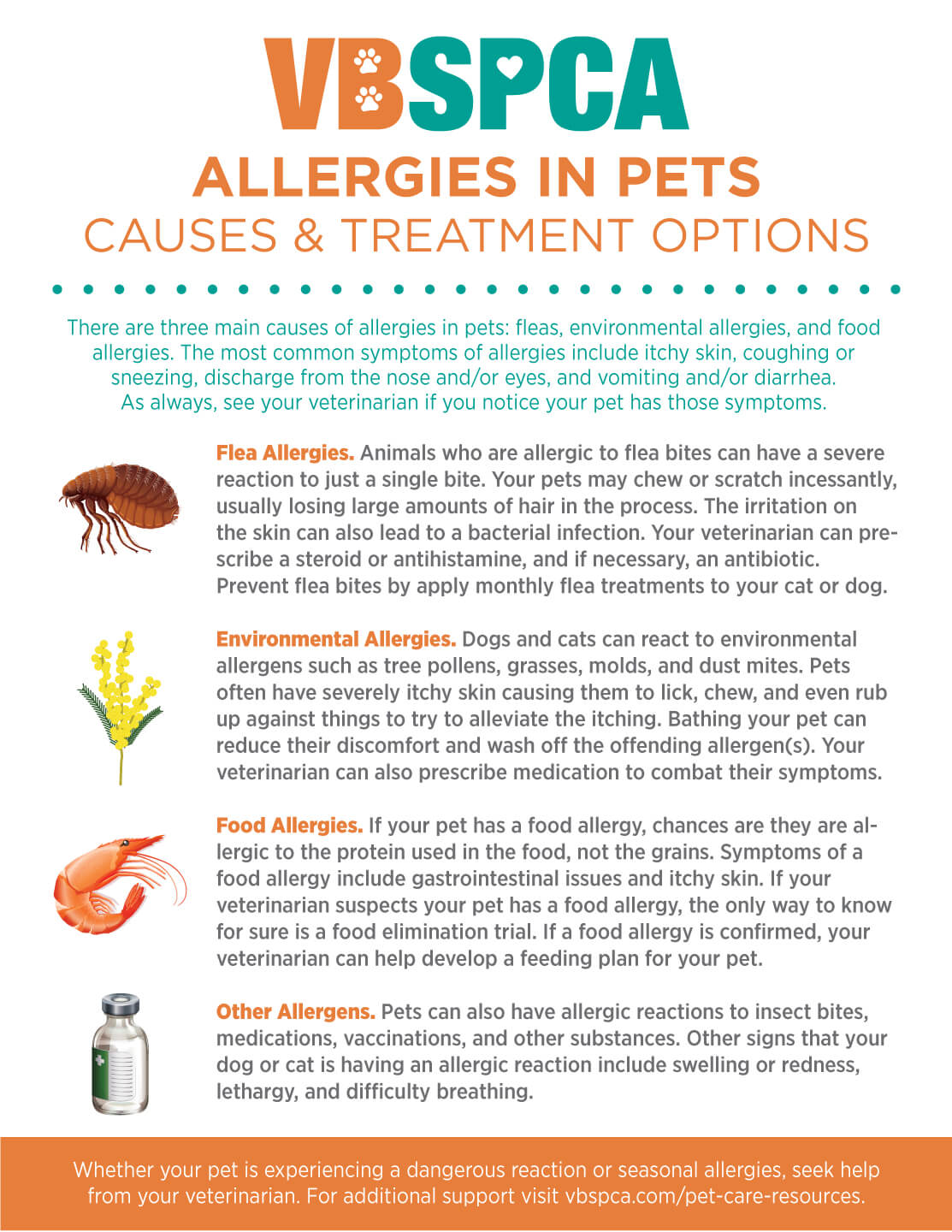

Pet Obesity | Managing Weight Issues
We’ve all been there: our pets do something cute or start to beg, and we head for the pantry to get them a treat. While it’s fine to give our furry friends a snack here or there, it is extremely important to keep them at a healthy weight with the help of exercise and a proper diet.
According to the Association for Pet Obesity Prevention, more than half of all dogs and cats are overweight or obese. Just like humans, extra weight on your pet can make them more susceptible to health problems such as diabetes, heart disease, liver disease, joint pain, and more.
Is My Pet Overweight?
Your pet will be weighed during his annual veterinary exam, but you also need to keep an eye on your pet throughout the year and note any changes. You should be able to easily feel your dog or cat’s backbone and ribs without pressing down. Additionally, you should be able to look down at your pet and see a noticeable waist between the rib cage and the hips.
There are a few things that can contribute to weight problems in pets. Illness, overfeeding, and lack of exercise can all lead to weight problems. If your pet is overweight, it is best to talk with your veterinarian to try to get to the root of the weight gain and decide on a game plan to help your furry friend drop those extra pounds.
Keeping Weight in Check
Even if your pet is not overweight, there are things you can do to help them maintain a healthy weight.
- Manage Meals
Serve your pet a few small, scheduled meals each day instead of allowing them to “free feed”. Free feeding is leaving an unlimited amount of food out for your pet to eat at their leisure. This practice does not allow you to know exactly how much food your dog or cat is eating throughout the day. By following daily feeding guidelines provided by your veterinarian and/or listed on the food’s packaging, you will ensure your furry friend eats the proper amount of food. - Encourage Exercise
Motivate your pet to move! This could include taking your dog for regular walks or getting the laser pointer out for your cat to chase around the house. Be sure to pick an activity that your pet enjoys, and increase the amount of activity as needed. - Swap Snacks
Treats can be a great tool to reward your pet during training or provide enrichment throughout the day, but they should not make up more than 10% of their total diet. While there are a lot of great treats for dogs and cats on the market, you can also swap out the ones you buy at the store for healthy options you may already have at home.
For Dogs: Carrots, green beans, apples (remove core and seeds), blueberries
For Cats: Peas, frozen corn, catnip, cat grass
For Both: Proteins, such as cooked lean meats or fish
You can also set aside some dry food from one of your pet’s meals for the day and give the kibble out as treats or hide it in a puzzle toy.
Being mindful of your pet’s diet and exercise habits will go a long way towards keeping them healthy. And one last tip: consider removing your dog or cat from the room during human meal times so that no one is tempted to hand out table scraps!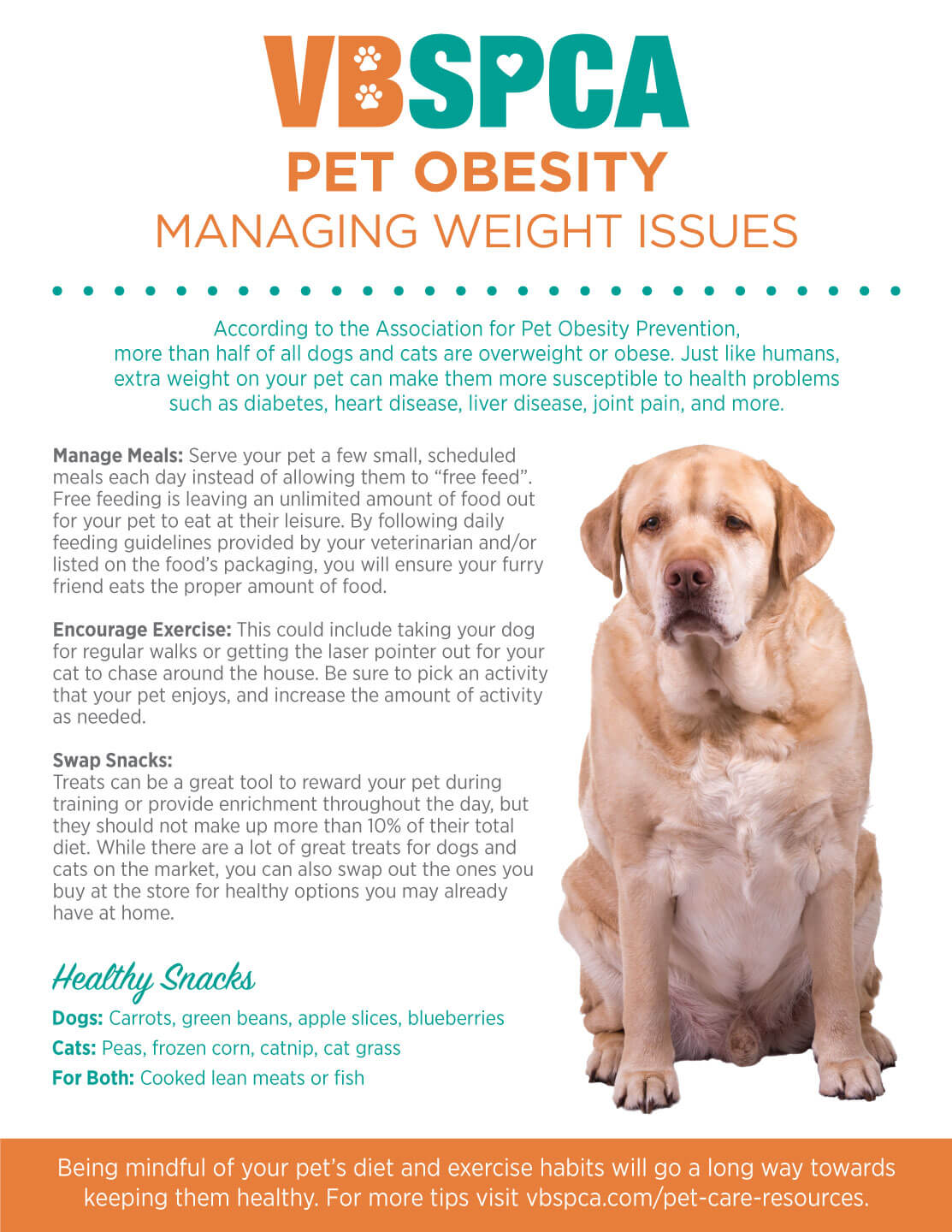

Happy Tails | Churro
Every single animal that comes through our shelter has a story. Some are complex, many are sad, but all of them get better the minute they arrive at the Virginia Beach SPCA. Churro came to the VBSPCA in December 2020 in need of medical attention and a second chance. The six year old Beagle mix hadn’t had the best care – she was heartworm positive from living outdoors and suffering from an inguinal hernia. Churro’s luck began to change when she walked through our doors, and her happily ever after came when she met Heather at the end of February 2021. We recently caught up with Heather to talk about the rest of Churro’s adoption story.
How did you find Churro?
 I found Churro on the VBSPCA website, she had the sweetest face and the description said she was a snuggler. She had some health problems, the biggest one being heartworm disease, which was intimidating, but I also knew that was a short-term issue and the unique circumstances of the pandemic meant I could be home and give her the extra supervision she needed those first few months during her treatment. I went with my dad to meet her in person and the room they put us in only had a small bench that we could barely fit on. When Churro came in I could tell she wanted to jump up onto the bench too, but I was sure she wouldn’t be able to fit. Next thing I knew, she had found her way up there, perched precariously between us. It showed me how much she craved love, and how she goes after what she wants.
I found Churro on the VBSPCA website, she had the sweetest face and the description said she was a snuggler. She had some health problems, the biggest one being heartworm disease, which was intimidating, but I also knew that was a short-term issue and the unique circumstances of the pandemic meant I could be home and give her the extra supervision she needed those first few months during her treatment. I went with my dad to meet her in person and the room they put us in only had a small bench that we could barely fit on. When Churro came in I could tell she wanted to jump up onto the bench too, but I was sure she wouldn’t be able to fit. Next thing I knew, she had found her way up there, perched precariously between us. It showed me how much she craved love, and how she goes after what she wants.
How is Churro doing in the home?
Overall she has adapted well. Her previous owners kept her outside so there were a lot of things she had to adjust to. It was a couple of months before she was fully house-broken, and she also had severe separation anxiety, but over time she’s gotten so much calmer and better at coping.
What sort of activities do you and Churro do together?
Churro loves going for walks more than any dog I’ve ever known. The first three months I had her, she was restricted to being in the yard on a leash because of her heartworm treatment. When she was finally allowed to be more active and explore, she was so excited. She gets very impatient when she thinks it’s time for her morning or evening walk, and when she sees me get her harness she’s so animated it’s difficult to put it on. Churro also likes riding in the car and visiting parks, as a Beagle/Hound mix she wants to smell and investigate everything.
 Does Churro have any funny quirks?
Does Churro have any funny quirks?
She loves stealing toys from the other family dog, Divi. It’s hilarious to watch her go to Divi’s bed, sniff around to find the perfect toy, then sprint off to hide it upstairs. I bring the toys back when she’s not looking, and the process repeats. Thankfully Divi is a good sport about it.
How has Churro enriched your life so far?
She is an endless source of love, joy and entertainment. I love when she’s pressed up against me snuggling on the couch, or bringing me the latest toy she has stolen.
Why do you think people should consider adopting a pet from a shelter?
To be transparent, there were a lot of difficult and frustrating moments the first couple months with house-training, dealing with the separation anxiety, and bad reactions to the steroids she needed for her treatment. But seeing firsthand how being in a loving home transforms animals proves it was all worth it. Churro always had sweet and endearing moments, she just seemed unsure of how to show and receive affection and had so much anxiety around anyone aside from me. It’s been unbelievably rewarding to watch her become more relaxed and confident, and she also seems so much healthier since completing her treatment and being able to exercise. Shelter animals may need extra time and care to adjust to their new homes, but with patience and love they can become the best companions.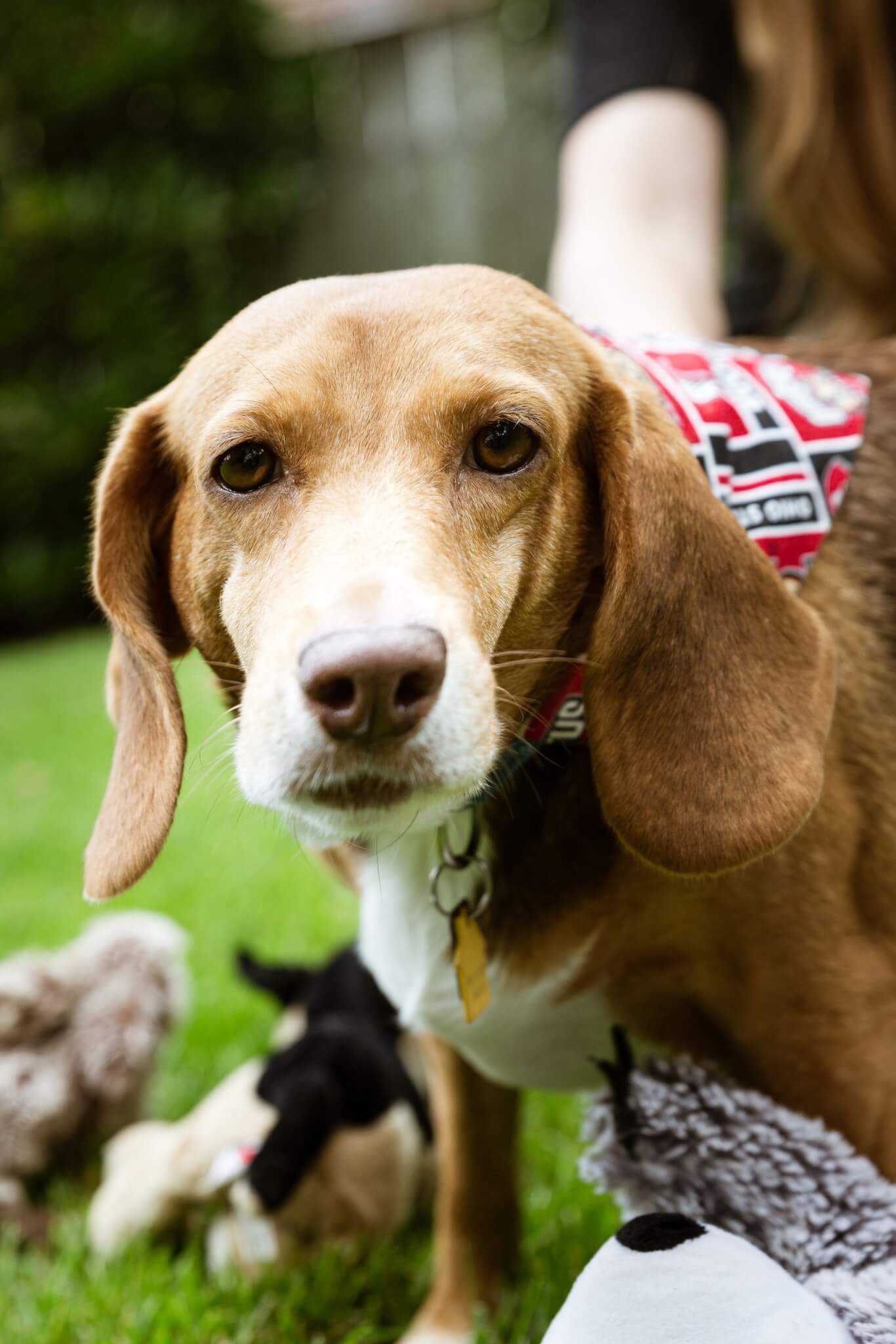
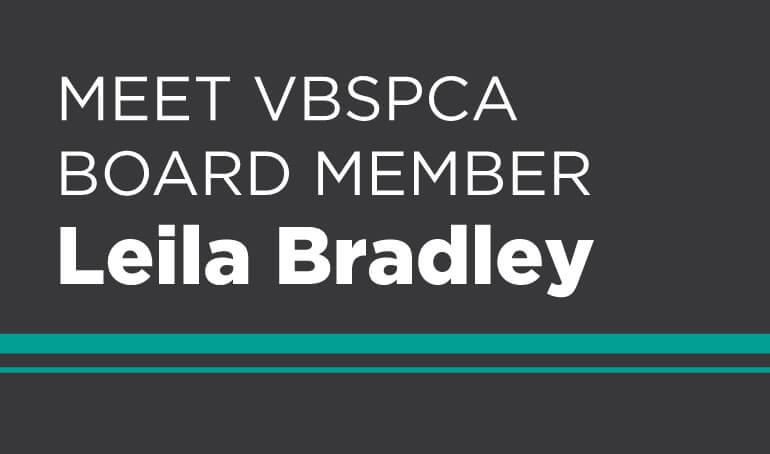
Leila Bradley | In Service to the VBSPCA for 3 Years
Leila Bradley first turned up at the Virginia Beach SPCA as a volunteer in 2017. She adopted her dog Scarlet that same year. A lifelong animal lover, Bradley wanted to become more deeply involved in the organization. When she had the opportunity to join the VBSPCA Board of Directors in 2018, she jumped at the chance.
Fast forward to now, as Bradley begins her time as Board Chair. “Eliminating animal suffering is what I am most passionate about,” said Bradley. “I believe the best way to achieve this is by increasing compassion for animals and educating the community.” Since Bradley joined the VBSPCA Board of Directors, she has aided the organization with her extensive financial expertise. Bradley has worked for TowneBank and Towne 1031 Exchange for nearly two decades, and is currently the Vice President of Towne 1031 Exchange. In addition to her service at the VBSPCA, Bradley is a member of the CHKD Infinity Circle and a volunteer for the United Way and the TowneBank Foundation.
Since Bradley joined the VBSPCA Board of Directors, she has aided the organization with her extensive financial expertise. Bradley has worked for TowneBank and Towne 1031 Exchange for nearly two decades, and is currently the Vice President of Towne 1031 Exchange. In addition to her service at the VBSPCA, Bradley is a member of the CHKD Infinity Circle and a volunteer for the United Way and the TowneBank Foundation.
As an active member of the community, Bradley encourages others to get involved with the VBSPCA. When asked how someone should get started, she answered, “By attending the VBSPCA events and visiting the shelter to see firsthand what an impact [the VBSPCA has] on the community and the animals they care for.”
Bradley aims to help the VBSPCA continue to grow as she steps up as the Board Chair and looks forward to working closely with the executive team. We are so grateful for her years of service, and we are excited for what’s to come!
If you are interested in serving on the Virginia Beach SPCA Board of Directors, please email derby.brackett@vbspca.com for more information.





















Last Updated: June 8, 2022 by vbspcaadmin
Grooming 101 | Tips for Caring for Your Pets
All dogs and cats need regular grooming to stay happy and healthy. Proper grooming includes keeping your pet’s eyes, ears, skin, nails, teeth, and fur clean. While all pets benefit from regular grooming, pets with long hair need a little extra attention to prevent their fur from getting tangled or matted.
Brushing your pet’s hair regularly does more than keep their hair tangle-free. It also removes dirt, spreads natural oils through their coat, and helps keep their skin clean. Brushing your pet’s hair is also the perfect time to make sure there are no fleas or ticks on your pet. Even dogs and cats who shed should be brushed 1-2 times per week.
Short-Haired Dogs
Dogs who have short hair and shed should be brushed once a week. Regular brushing can even help prevent the frustration of finding loose hair all over your home. Some dogs shed year-round while others shed seasonally in the spring and fall. If your canine companion is in a heavy shedding period, you should brush them more frequently than once a week.
In addition to brushing, your dog should be bathed at least once every three months. Consider bathing more frequently if your dog spends a lot of time outside or has skin issues.
Long-Haired Dogs
Dogs with long hair will need to be brushed daily to remove tangles and prevent matting. If you come across a tangle, gently brush it out. For tougher tangles and matts, carefully clip the hair instead, but be sure not to cut the skin.
Dogs with long, silky coats will also need to visit a professional groomer to have their hair trimmed approximately every 4-6 weeks. These breeds include Yorkshire Terriers, Shih Tzus, Poodles, and Maltese. In addition to a haircut, your pet’s groomer will also bathe them and trim their nails. It should be noted that dogs who have long hair and a double coat should never be shaved down including breeds such as Huskies, Golden Retrievers, and Pomeranians.
Short-Haired Cats
If your cat has short hair, you should comb their hair 1-2 times per week. Removing dead or loose hair through brushing will help prevent your cat from having hairball issues. Cats are mainly self-bathers: they use their tongue and teeth to bathe themselves. However, if your feline friend is overly dirty or gets into something sticky or smelly, you may need to give them a bath.
Long-Haired Cats
Cats with long hair will need to be brushed every few days to keep their long locks tangle-free. If you come across a knot, you can put a little talcum powder on the knot and use your fingers to tease it out. Just like short-haired cats, our long-haired friends are great about bathing themselves. However, if your cat is matted you may need to visit a professional groomer.
Professional Grooming Services
As mentioned above, keeping your pet properly groomed includes not only brushing their fur, but also trimming their nails, bathing them, and keeping their eyes, ears, and teeth clean. You may choose to purchase all of the necessary equipment and learn how to do these things on your own, but you should also enlist the help of a professional groomer when needed.
When to Groom at Home:
– You have the proper tools and supplies
– You feel comfortable using cutting shears, nail clippers, etc.
– Your pet is calm and cooperative
When to Contact a Professional:
– You don’t feel confident grooming your pet
– You do not or cannot invest in quality grooming equipment
– Your pet is uncooperative
Grooming your pet can be a difficult process at first, but with time and patience, it can become a great bonding experience.
Need help finding a professional groomer? Check out our list of recommended groomers here.